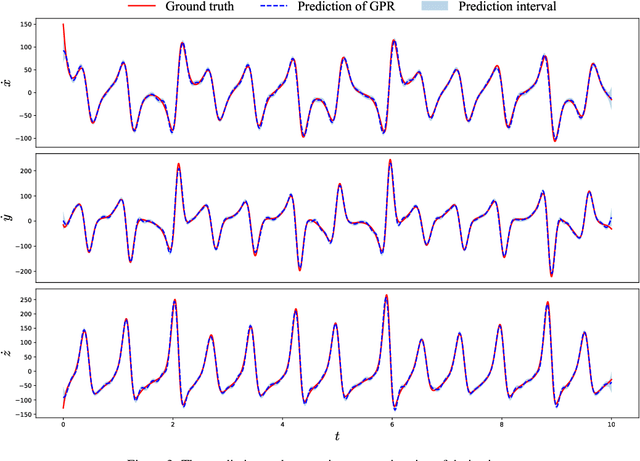Yuhuang Meng
Sparse discovery of differential equations based on multi-fidelity Gaussian process
Jan 22, 2024



Abstract:Sparse identification of differential equations aims to compute the analytic expressions from the observed data explicitly. However, there exist two primary challenges. Firstly, it exhibits sensitivity to the noise in the observed data, particularly for the derivatives computations. Secondly, existing literature predominantly concentrates on single-fidelity (SF) data, which imposes limitations on its applicability due to the computational cost. In this paper, we present two novel approaches to address these problems from the view of uncertainty quantification. We construct a surrogate model employing the Gaussian process regression (GPR) to mitigate the effect of noise in the observed data, quantify its uncertainty, and ultimately recover the equations accurately. Subsequently, we exploit the multi-fidelity Gaussian processes (MFGP) to address scenarios involving multi-fidelity (MF), sparse, and noisy observed data. We demonstrate the robustness and effectiveness of our methodologies through several numerical experiments.
Physics-informed invertible neural network for the Koopman operator learning
Jun 30, 2023Abstract:In Koopman operator theory, a finite-dimensional nonlinear system is transformed into an infinite but linear system using a set of observable functions. However, manually selecting observable functions that span the invariant subspace of the Koopman operator based on prior knowledge is inefficient and challenging, particularly when little or no information is available about the underlying systems. Furthermore, current methodologies tend to disregard the importance of the invertibility of observable functions, which leads to inaccurate results. To address these challenges, we propose the so-called FlowDMD, a Flow-based Dynamic Mode Decomposition that utilizes the Coupling Flow Invertible Neural Network (CF-INN) framework. FlowDMD leverages the intrinsically invertible characteristics of the CF-INN to learn the invariant subspaces of the Koopman operator and accurately reconstruct state variables. Numerical experiments demonstrate the superior performance of our algorithm compared to state-of-the-art methodologies.
 Add to Chrome
Add to Chrome Add to Firefox
Add to Firefox Add to Edge
Add to Edge